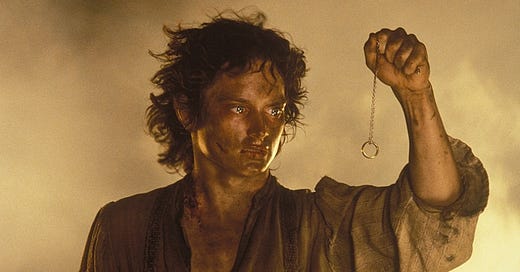Forgive Us Our Trespasses: How Frodo’s Pity Draws from Jesus’ Most Famous Prayer
The Influence of the Lord's Prayer on The Lord of the Rings
Frodo stands above the Cracks of Doom, just a heartbeat away from the defeat of the Dark Lord Sauron and the salvation of Middle-earth. He has journeyed all the way from the Shire to the very fires of Mount Doom and is on the cusp of succeeding in his quest. But unexpectedly, he hesitates. And our excitement and joy as readers and viewers changes to horror and disbelief as catastrophe strikes. The hero who came so close to succeeding fails in his quest, claiming the Ring as his own and vanishing.
Then, out of the jaws of defeat: an unexpected turn! We catch our breath and tears may even fill our eyes as Gollum snatches the Ring from Frodo and falls into the fires by accident. The quest is completed! A eucatastrophe has risen from the ashes of catastrophe! Victory is won and joy fills our hearts.
The climax of The Return of the King is hardly your archetypical one where the hero succeeds in their quest and defeats the villain by their skill, luck, or some combination of the two. Instead of triumphing, Frodo fails. And salvation comes from one of the unlikeliest sources imaginable: Gollum.
How did Tolkien decide upon this sequence of events? Why confound our expectations in this way? Did these ideas originate solely within his imagination or were there any specific outside influences on the shape of the narrative?
You would probably not be surprised to hear that, as a Catholic, J.R.R. Tolkien’s faith influenced his work, including The Lord of the Rings. And you also might not be surprised to hear that Tolkien was familiar with the Lord’s Prayer. It’s one of the most famous prayers ever to be prayed, the example Jesus gave his disciples when he taught them how to pray during the Sermon on the Mount in the Gospel of Matthew. But did you know that two specific petitions of The Lord’s Prayer directly influenced this particular scene from the climax of The Return of the King?
Found in chapter 6 of the Gospel of Matthew, the whole prayer is as follows:
This, then, is how you should pray:
‘Our Father, Who art in heaven,
Hallowed be Thy Name.
Thy Kingdom come.
Thy Will be done,
on earth as it is in Heaven.
Give us this day our daily bread.
And forgive us our trespasses,
as we forgive those who trespass against us.
And lead us not into temptation,
but deliver us from evil. Amen.’
—Matthew 6:8-12
The influence of this prayer on the narrative of The Lord of the Rings is not made explicit anywhere within the text of the story itself. But in a draft of a letter Tolkien explains just how the Lord’s Prayer influenced the shape and course of the narrative.
Special shout-out to Lisa N, who became a member of Jokien with Tolkien: Extended Edition this month! I so appreciate each and every paid subscriber and your support of me and this newsletter. Enjoy the rest of this Extended Edition Exclusive Essay.
To join them and all the other members of the Extended Edition in reading the rest of essays like this and voting for topics of future essays, upgrade today!
Keep reading with a 7-day free trial
Subscribe to Jokien with Tolkien to keep reading this post and get 7 days of free access to the full post archives.






